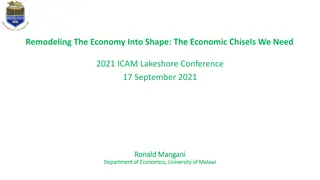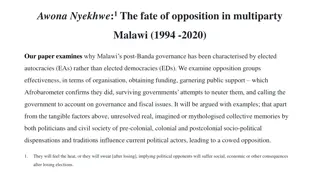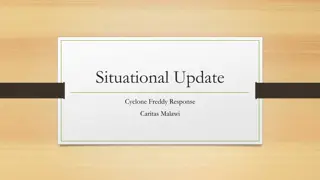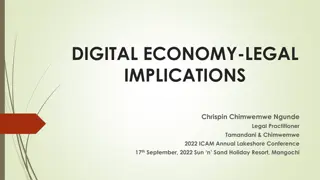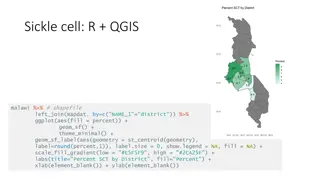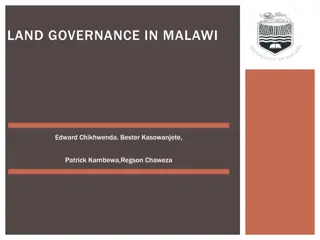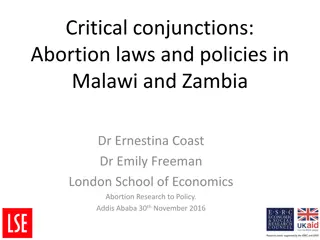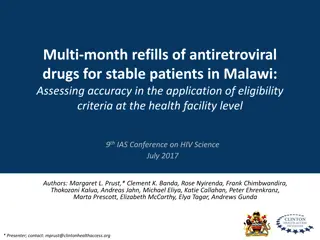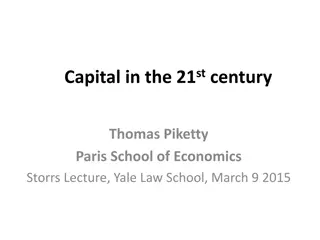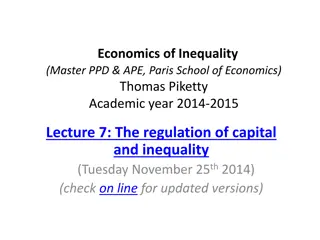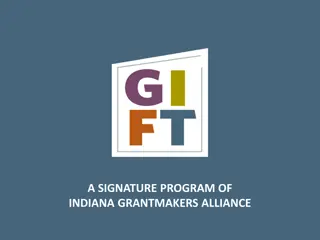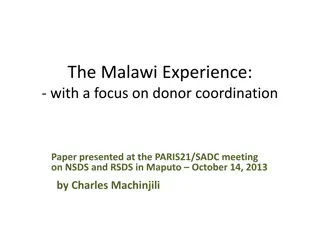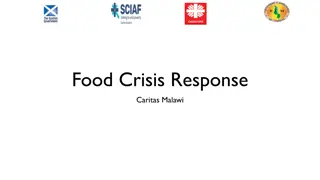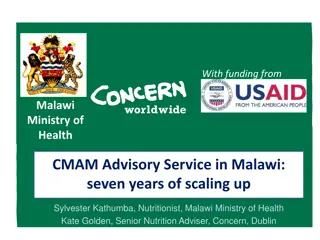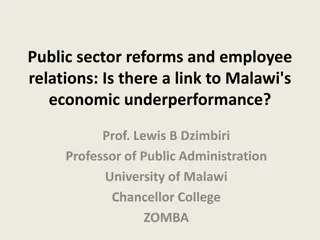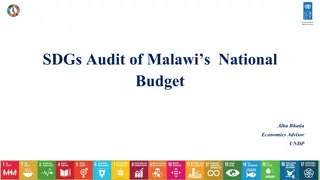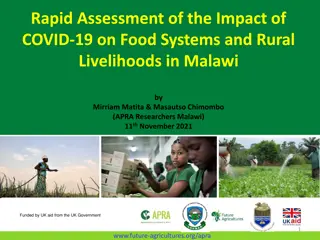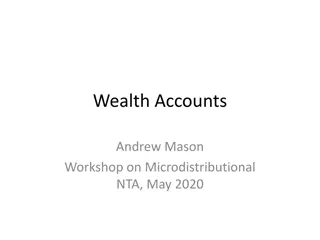Spearheading Wealth Creation: Malawi's National Development Agenda
Malawi's National Planning Commission (NPC) plays a crucial role in developing long and medium-term development plans to ensure continuity beyond political regimes. Tracing the country's development agenda, from short to long-term plans like Malawi Vision 2020, reflects the commitment to sustainable growth and wealth creation for all citizens.
Download Presentation

Please find below an Image/Link to download the presentation.
The content on the website is provided AS IS for your information and personal use only. It may not be sold, licensed, or shared on other websites without obtaining consent from the author. Download presentation by click this link. If you encounter any issues during the download, it is possible that the publisher has removed the file from their server.
E N D
Presentation Transcript
ICAM 2019 CONFERENCE: POSITIONING FOR AFRICA S ECONOMIC RENAISSANCE MALAWI IN THE EQUATION New National Development Agenda for Malawi: Spearheading Wealth Creation for All Thomas Chataghalala Munthali, PhD Director General tmunthali@npc.mw
Outline 1. Mandate of the Commission 2. Tracing the development agenda road 3. Moving forward charting a new path 4. Conclusion
Mandates National Planning Commission (NPC) was established through an Act of Parliament in 2017 with the main aim of ensuring continuity of development programmes beyond one political regime It has two main mandates of: 1. Developing long and medium-term development plans based on the country s comparative advantages and resource potential 2. Coordinating/overseeing implementation of the plans (M&E, capacity needs assessment, and reporting for accountability) Coordination of development plans at national, sectoral, decentralized and development partner levels is key to void the silo business-as-usual approach. The Commission reports to the President and Parliament It s a Think Tank created to support Government in evidence-based planning and implementation including production of cabinet and parliamentary briefs on critical development issues.
Tracing the development Tracing the development agenda road agenda road
The need for long-term development planning After independence, Malawi s development plans were guided by short to medium term plans (10yr Dev Pols) In the multiparty era after 1994, it was felt important to develop a long- term development framework upon which short and medium term plans would be based. This was an important step in ensuring continuity of development programmes beyond any political regime - though not institutionalized at that point (unlike now with the enactment of the NPC) The Malawi Vision 2020 hence came on board in 1998 Linked to it over time were medium and short term national development strategies: Malawi Poverty Reduction Strategy (MPRS; 2000-2005), the Malawi Growth and Development Strategies (MGDS I, 2005-2011; MGDS II, 2012-2016; and MGDS III, 2017-2022).
Vision 2020 Malawi, by the year 2020, as a God-fearing nation, will be secure, democratically mature, environmentally sustainable, self-reliant, with equal opportunities for and active participation by all, having social services, vibrant culture and religious values, and a technologically driven middle-income economy.
The transformation failure Attainment of the Vision 2020 was largely premised on structural transformation Movement of labor from low productivity sectors like agriculture into more modern sectors of the economy like manufacturing and productive service sectors (ICT, finance, etc) Entailed making agriculture more commercial and efficient so the sector could feed the population and provides raw materials for the agro-industry Entailed a service sector that indeed serviced the manufacturing and agriculture sectors
Context: Africas Industrialisation Challenge Africa s growth path has been unconventional Developed economies moved from agriculture, to manufacturing, to services African economies moved straight to increased services without capitalising on manufacturing Also did not significantly reduce share of low productivity employment. MVA Share in GDP 30% 25% 20% 15% 10% 5% 0% 19761980198419881992199620002004200820122016 Singapore Malaysia Africa 9
Malawi transformation path Vs Asian tigers MVA Malawi, Singapore, Malaysia 3 2.5 2 1.5 1 0.5 0 1975 1977 1979 1981 1983 1985 1987 1989 1991 1993 1995 1997 1999 2001 2003 2005 2007 2009 2011 2013 2015 2017 Malawi Singapore Malaysia
The resultant economic development has largely been dismal In 2018, GDP/capita was around USD381 falling short by over USD600 to reach the lower middle-income target of USD1000 If we are to grow by around 7% each year, we will reach the middle income status around 2034 (15 years from now) if population growth rate is at replacement level By 2063, Malawi has possibility of being an upper middle income economy. GDP per Capita for Malawi (US$) 1200 1000 800 600 400 200 0 1975 1977 1979 1981 1983 1985 1987 1989 1991 1993 1995 1997 1999 2001 2003 2005 2007 2009 2011 2013 2015 2017 GDP/capita Target
Reflection To those who use well what they are given, even more will be given, and they will have an abundance. But from those who do nothing, even what little they have will be taken away. Matthew 25:29 New Living Translation (NLT)
Moving forward Moving forward charting a new path path charting a new
Developing successor to Vision 2020 New narrative - from poverty reduction to spearheading wealth creation for all Beyond the survival basics to higher wealth levels.
Why focus on wealth creation? The focus on wealth creation is important for two reasons: First, it entails thinking positively about the need to create jobs for our people (through a vibrant private sector and entrepreneurial population). For a long time, the focus has been on poverty reduction which has a negative image of wanting to make efforts to be better off but assumes that we have accepted to be poor (just reducing on poverty and not eliminating it). The strategies this far have hence largely revolved around providing for the basics of a poor person. But it s time to think beyond the basics and help every Malawian to meet their full potential and generate wealth for themselves and the country to live dignified lives. Secondly, if we have a nation that is creating wealth, the country will be able to generate its own resources (forex and domestic resource mobilization) with which to realize the new Vision basically supporting its development agenda primarily using its own resources and not looking externally for support all the time.
Why focus on wealth creation? More important reason: accountants need money to be in business, without wealth, accountants will become an endangered species
Ultimate goal Back to the 7 basic needs 1. Food 2. Health 3. Housing 4. Security 5. Education 6. Opportunities for all 7. Entertainment Only possible with wealthy househol ds and Country How will we know we are wealthy? It s about meeting minimum requirements (GDP/capita can be misleading).
Key strategies for creating the wealth 1. Mindset change positive thinking identify catalytic initiatives that are working (Potentials are unlimited - Ndizotheka Programme quick wins). Along with patriotism, discipline, focus, honesty, integrity, disdain for hand- outs, hard work , etc 2. Agricultural commercialization (private sector engagement key) Sustainable Markets Key Focus on increasing production and productivity volumes Anchor farm and cooperatives promotion farming by choice and not default Just like tobacco, use of structured markets for all crops identified as strategic for exports like oil seed crops, cotton, rice, industrial hemp will ensure volumes, minimize side-selling, and promote require standards Ethiopia case Never let go of bilateral and multilateral preferential access opportunities utilize our arable land and cheap labor comparative advantage Produce excess for value adding but crawl before walking Import substitution Malawi should NEVER import an agricultural commodity for which it can produce competitively locally.
Key strategies for creating the wealth 3. Resource-based industrialization/manufacturing (Private sector involvement key) SEZs with industrial parks Provide full incentives based on each individual investor need on a certain threshold of investment value Develop/operationalize/market the purpose financial vehicles like Export Development Fund, Malawi Agricultural and Industrial Investment Corporation, Mining Promotion Fund piggybacking on the huge pension funds Removing burdensome regulations, curtail corruption, etc) simply make Malawi the best investment destination by providing every incentive that is within our control hence sending signals to existing and potential investors that Malawi is fully open for investment. Import substitution identify and produce locally all manufactured products for which Malawi can produce competitively.
Key strategies for creating the wealth 4. Urbanization (private sector key) creating a system of secondary cities across the country based on investment opportunities (mapping exercise underway including in tourism attraction points like Cape Maclear)
Urbanization for spatial development - Mapping for nation-wide bankable flagship investment centres
Framework for the nation-wide mapping exercise for investment planning
Increasing livelihood options for Malawians with emphasis on rural populations (leaving no one behind)
Are we developing another vision? Vision 2020 states Malawi, by the year 2020, as a God-fearing nation, will be secure, democratically mature, environmentally sustainable, self-reliant, with equal opportunities for and active participation by all, having social services, vibrant culture and religious values, and a technologically-driven middle-income economy. In general, with some minor tweaks, the Vision 2020 remains relevant and will remain so for generations to come. The Commission hence proposes to have both a Vision (which can be a modification of the existing) and a long-term development plan based on a defined development philosophy (mixed economy) that will operationalize the country s agreed Vision.
So what period are we looking at for the next Vision? The period has to be long enough to largely target the welfare of future generations where do we see the future of the largely smallholder community 40 years from now? The need to link to the continental/African-driven aspirations manifested in Agenda 2063 of a prosperous, integrated/united and peaceful continent all elements of which remain relevant to Malawi Hence proposes National Transformational 2063. The transformation entails transformation of: mind-sets (towards more positive thinking of the huge development potentials Malawi has and ethos of hard work, hate for hand-outs, patriotism, integrity, etc) Structure of economy (more towards value adding, industrialisation and urbanisation) Development philosophy (mixed economy) from poverty reduction to wealth creation.
What are some of the critical success factors Firstly, participation and inclusion of all stakeholders in the conception, design, implementation, monitoring and evaluation of the development framework is a critical success factor. Secondly, ensure a results-based approach with concrete targets that are measurable and can be tracked and monitored; Thirdly, the need for changes in attitudes, values and mind-sets to inculcate the right set of Malawian values. Includes patriotism, discipline, focus, honesty, integrity, disdain for hand-outs, hard work - these need to be addressed if the long-term development plan is to be different and be successfully implemented.
The Process and Organizational Arrangements First, reviewing the Vision 2020 to identify lessons learnt over the years what has worked and not and why. Series of consultative meetings with various stakeholders across the country to establish common aspirations toward the new development framework. The consultations will take the form of meetings, workshops, panel discussions, radio phone-in, inputs drop-box at the NPC secretariat, and web-based inputs (especially for the diaspora). The NPC will coordinate the task of developing the new long-term national development plan through a multi-stakeholder approach. A Core Advisory Panel (CAP) has been identified by the NPC that comprising Malawian experts from various sectors that will act as a resounding board for the development pathways and priorities to be defined by the NPC and its Core Technical Team
The Process The Plan will also clearly define the critical factors for success, potential risks, threats and mitigation strategies. This will include how to make it happen implementation, monitoring, evaluation, financing, capacities for implementation and communication aspects.
Duration of the visioning process Duration of the Vision formulation process will be 15 months from May 2019 to July 2020 when the vision will have been finalised and launched. A Roadmap for the New Vision has already been defined
Presenting the proposed core teams driving the envisioning process Cabinet PS' Committee NPC Commissioners NPC Commisioners Chairpersons of Parliamentary Committees Core Advisory Panel (CAP) Core Technical Team (includes Directors of Planning from MDAs and consultants)
Link of New Vision to MGDS III The long term vision/plan gets operationalized through 5-year medium-term development strategies Currently, Vision 2020 is being operationalized by the (Malawi Growth and Development Strategy (MGDSIII) which is focused on a productive, competitive and resilient nation The plan is to now begin to develop 10-year plans that will operationalize the Successor Vision Soon after adoption of the successor to Vision 2020, the MGDS III will be reviewed so as to align its priorities to the New Vision.
Improving implementation of MGDS III MGDS III will be reviewed after Successor Vision is adopted Meanwhile, the following have been defined as strategies for improving implementation of the MGDS III and its successor: 1. Coordination key Activating all Sector Working Groups (SWGs) 2. Ndizotheka programme 3. Annual MGDS implementation reviews Reports to be presented to Cabinet and Parliament for accountability Focus on what is working and not working and why; analysis of the implementation capacity needs and defining capacity development strategies/plans .
Conclusion Supporting a positive mindset agenda both in terms of development narrative (away from poverty reduction to wealth creation) and having a Malawian value system (patriotism, hard work, hating hand-outs, integrity) is key Focus should be on getting things done more than planning with focus on scaling-up few but strategic interventions that work while holding each other accountable (including development partners) Coordination in implementation of plans/strategies and policies (including development partner programmes) will avoid duplication of efforts/resources and hence accelerate development.
Reflection The problems of the world cannot possiblybe solved by sceptics or cynicswhose horizons are limited by the obvious realities.We need men [and women] who can dream of things that never were. - John F. Kennedy
The Malawi we want is possible! Let s be part of the history of creating it! Thanks for your attention!







